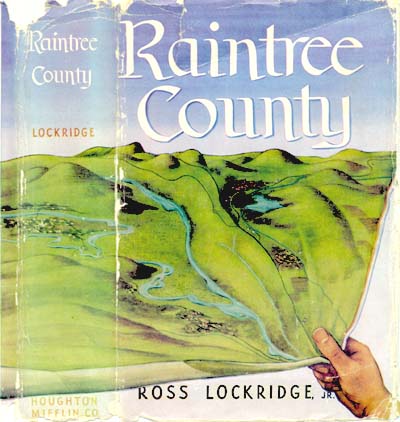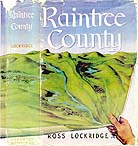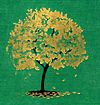 |
 |
 |
 |
 |
|
 |
 |
|
 |
 |
|
 |
 |
|
 |
...which had no boundaries in time and space, where lurked musical and strange names and mythical and lost peoples, and which was itself only a name musical and strange. |
 |
|
Melville is a sea fir, the curve of the keel |
 |
 |
 |
 |
 |
|
 |
 |
|
 |
 |
|
 |
 |
|
 |
...which had no boundaries in time and space, where lurked musical and strange names and mythical and lost peoples, and which was itself only a name musical and strange. |
 |

"Once long ago when I reread Raintree County, I had a momentary impulse to write a literary critique, something I never do, to be called 'He Came, and Ye Knew Him Not.' By him I meant the author of 'the great American novel.'" --From "Raintree County Sixty Years Later: A Remembrance" by Herman Wouk, Forward to the Chicago Review Press edition. (more)
 |
The Novel Raintree County Chicago Review Press |
 |
|
|
Chicago Review
Press |
|
Used Houghton Mifflin & |
Acclaim for Ross Lockridge, Jr.'s 1948 novel -- 16 excerpts with 4 unabridged reviews "An achievement of art and purpose, a cosmically brooding book full of significance and beauty." -The New York Times
"Like the environmental novels of the last (2) decade(s) [Edward Abbey, The Monkey Wrench Gang (1975), A.B. Guthrie, Jr., Arfive (1971), and Jack Schaefer, Mavericks (1967)], Raintree County calls, ultimately, for a perception of space and place that is neither national nor social, but rather is ecological--the perception that person and place, space and time, are interdependent and one. It is an ecological novel written before its time, and its time has finally come." -Fred Erisman, Markham Review
"No myth is more imposing than the Great American Novel; but if it is truly unattainable, I believe that Ross Lockridge, Jr. made closer approach than any other writer has, before or since." -Larry Swindell, syndicated Books Editor of the Fort Worth Star-Telegram, July 26, 1998.
"No wonder critics of the day could not, or would not, understand the novel. . . Lockridge could see all too well what was happening to his beloved country. (Also ahead of time, and unappreciated, was his fear for the natural environment of Raintree County, his sense that America was under attack from railroad tracks and smokestacks.)
Larry Lockridge says his father hoped the novel would remind people of the original promise of America, 'still alive though stunted.'" --Complete review: Marcia Abramson, Detroit Free Press"My favorite novel of all time is Raintree County. It's about American journalism, patriotism, and a star-crossed love affair a hundred years ago. Like the Bible, you can pick it up, read any page, and gain something. It's poetry. Forget the movie, if you saw it, the book is something entirely different." -Edna Buchanan, author, You Only Die Twice and Cold Case Squad. Recipient of the Pulitzer Prize in 1986 for general reporting at the Miami Herald.
"The powerful currents and depth of this great swollen river of a book remain irresistible. Raintree County doesn't have to be the great American novel to be an American classic and a classic expression of the American dream; a time and place in our history are made permanent in this book." -Complete review: Richard Dyer, Boston Globe
"Just how good is Raintree County? . . . Looking back at it, one is struck by the strength of its prose and the life of its characters. The Civil War section alone, well over 200 pages and the heart of the book, justifies the extravagant Great American Novel claims some critics have made for it. . . . Had Ross Lockridge, Jr. lived, he might well have changed the direction of American writing-for that, and nothing less, was his intention." -Bruce Cook, Chicago Tribune
Raintree County is "a work that should rank with Thomas Wolfe's Look Homeward, Angel as a landmark in American fiction." Ross Lockridge, Jr. attempted to "write the great American encyclopedic novel, one that absorbs all the modern literary devices of his day and breathes them forth refashioned on a wind from Walt Whitman." -Donald Newlove, Philadelphia Inquirer.
"[An] extraordinary work . . . I have reread Raintree County at least once a year. It is a book that I, at least, have grown into, still grow into." -Robin Mather, Detroit News
"[A]t the end of the century, when lists were propounded identifying the great novels of the epoch.... Raintree County was an egregious omission. . . . Lockridge himself once wrote of Victor Hugo's Les Miserables: 'This immense work, full of interminable descriptions, digressions, superfluous episodes, offering us realism, romanticism, sentimentality, artificiality, lyricism, satire -- in short, everything -- manages even because of this amplitude to give a sensation of epic nobility and diverse genius.' The description applies to Raintree County. . . . The sheer ambition, to create a kind of Ulysses embodying America, embraces the reader at the beginning and doesn't let up. It has a Whitmanesque exuberance." -Dick Cady, Pulitzer Prize-winning journalist, The Herald-Times, March 4, 2001
Raintree County "still holds up well. In fact, the book's views on women's rights, on ecology and other current issues help make a convincing case that Lockridge was simply writing a generation ahead of his time. . . The book was made to suffer as a literary work because of its popularity. . . Lockridge has been dead now for nearly half a century. Perhaps this time around, his novel will find its intended audience." -William Lutholtz, Indianapolis News
"[A] candidate for that mythical honor, the Great American Novel, Raintree County displays unflagging industry [and] a . . . magnificent vitality." -Saturday Review
"Scores of characters flit through its pages, characters that a Hogarth or a Bruegel might have assembled on canvas, characters that suggest both Whitmanian energies and Dickensian drolleries, and characters that have a fey poetic charm. . . The sheer sparkle and dazzle of things holds and compels. . . But I trust eventually the great appeal of the book lies in its visionary prose, in its architectonics, and in its narratology. It is not surprising to see the language acquire wings and take off as though possessed, wanting to reach out to the extremities of human thought and experience." -Complete review: Darshan Maini,The Tribune of India
"Many had tried to write the great American novel. Few had been told during their own lifetimes, and especially so young, that they had succeeded. . . For Ross Lockridge as a young man worked with a drivenness, day and night, trying always to be bigger than big, including not only all of the mythology of America in its pastoral singing, but all of the mythology of all time. . . [The novel's sadness] seems to come more from a cosmic anticipation than an actual knowledge, or perhaps from a deep spiritual knowledge, rooted in his family history and his bones." -Erika Duncan, The New York Times
Raintree County is "a book that many people--including myself--believed was the closest any work had ever approached the mythical goal of the Great American Novel." -Leonard Duckett, Fort Worth Star-Telegram
"I would argue that the paragraph, not the sentence, is the basic unit of writing-- the place where coherence begins and words stand a chance of becoming more than mere words. If the moment of quickening is to come, it comes at the level of the paragraph. It is a marvelous and flexible instrument that can be a single word long or run on for pages (one paragraph in Don Robertson's historical novel Paradise Falls is sixteen pages long; there are pages in Ross Lockridge's Raintree County which are nearly that). You must learn to use it well if you are to write well. What this means is a lot of practice; you have to learn the beat." -Stephen King, ON WRITING, Scribner, 2000, p.134. [Such long paragraphs actually are not to be found in the novel, but Stephen King's remembrance is itself testament to their solid relatedness, rhythm, or quickening. --RLIII, RC.com]
"The republication of Raintree County and the publication of Shade of the Raintree are indeed the most important literary publications of 1994 . . . In these two publications, a remarkable, perhaps even a great literary work will continue to live in spite of the vagaries of literary fashion, popular taste, or literary celebrity. If Raintree County is not the fabled Great American Novel, it will do until that unlikely work appears. . . Evident at once in re-reading the novel is not only the durability of the characters and the myth that Ross Lockridge created, but the elements that make the novel even more timely in 1994 than it was in 1948." -Complete review: David Anderson, Director, The Center for the Study of Midwestern Literature and Culture

| The Novel | Essays | Other Writings | RL Jr. Writer's Award | Complete Contents | Book Orders |
| The Biography | Links | Photos / Postcards | RC Source & Facsimiles | Suicide & Prevention | Movie & Score |